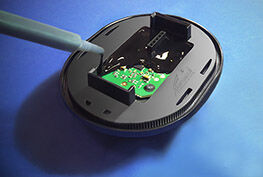Electronic Component Potting
Electronic components inherently require protection from moisture and mechanical damage. For this reason, they are typically sealed with materials offering protective properties. These processes take place prior to next level of PCB assembly. Components such as capacitors, switches, and relays are typically designed with shallow cavities for containment, so that low viscosity potting materials may be dispensed quickly during automated production.
Panacol-USA offers single component, light curable potting materials of the Vitralit® brand, or thermally curing potting compounds of the Structalit® line. Both adhesive brands are specifically formulated to act as barriers against contamination, chemicals, moisture, and handling damage. These materials dispense easily, cure quickly, and provide a protective surface that is dry and tack-free.
LED curable adhesives are included in Panacol-USA’s product selection for electronic component potting and encapsulating. These adhesives fully cure in fractions of a second under low intensity UV or Visible light. They are ideal for use with LED light curing equipment.
Panacol-USA’s broad selection of potting materials bond to a variety of substrates including ABS, nylon, polycarbonate, and plated metals. Light curable materials are available with a secondary thermal cure catalyst in the event that shadowed areas exist in the potting field. Typical thermal curing schedules are identified on individual product technical data sheets.
Processing time for shallow potting of electronic and electrical components can be significantly reduced by incorporating light curable potting materials from Panacol-USA. These electronic component potting materials are formulated to protect components and connectors from thermal shock, vibration, moisture, and other environmental elements.

Electronic components of a sensor are shielded from damage with a black potting compound
UV curing equipment:
UV system solutions with Panacol uv curable adhesives and innovative curing systems from Honle
Download brochure:
Adhesives of the Vitralit® line are light curable potting materials. They are single component and solvent-free, and are easily dispensed from automated valve dispensing systems. A wide range of viscosities are available to meet component configuration and processing challenges. When cured, these materials exhibit dry, tack-free surfaces that resist contamination from airborne particulates and handling.
Structalit® adhesives are solvent free single or two-component adhesives. They are mostly based on epoxy resin and can be cured at room temperature or by exposure of heat. For heat-sensitive components low temperature curing adhesives are available.
View the potting products listed below for a possible candidate for your application. Please contact Panacol-USA to confirm your product selection and to secure additional application assistance, including samples and process recommendations.
New from Panacol are single component epoxy adhesives that cure at low temperatures, (60oC). Structalit® 5511, 5521, and 5531 adhesives were specifically formulated for microelectronics applications and adhere very well to low surface energy substrates. These products are ideally suited for potting temperature sensitive components. Find them in our table below and click on their Technical Data Sheets for more detailed information.
| Potting materials: | Viscosity [mPas] | Base | Curing* | Properties |
|---|---|---|---|---|
| Vitralit® 1600 LV | 3,000-5,000 | epoxy |
UV secondary heat cure |
Very high Tg low water absorption low ion content very high chemical resistance |
| Vitralit® 1650 | 3,000-5,000 | epoxy | UV |
Electronic grade low ion content suitable for chip protection UL94 HB test passed |
| Vitralit® 1671 | 9,000-14,000 (Rheometer, 10s^-1) | epoxy |
UV secondary heat cure |
Stable frame compound high ion purity electronic grade adhesive high temperature conductivity low water absorption UL94 HB test passed |
| Vitralit® UD 5180 | 4,000-6,000 | epoxy |
UV secondary heat cure |
Perfect solution for bonding flexible circuit paths resistant to reflow processes grey color |
| Structalit® 5894 M | 20,000-30,000 (Rheometer, 25 °C, 20s ^-1) | epoxy | thermal |
Black color excellent flow properties filling material for frame and fill applications on PCBs, very high resistance to heat and chemicals |
| Vitralit® 90020 | 1,000-2,000 | acrylate |
UV VIS |
adheres to a variety of substrates including polyimide, polyester, polycarbonate, metals, ceramic, and glass high ionic purity highly resistant to moisture Low durometer, high flexibility Dry, tack-free surface |
| Vitralit® 90046 | 1,000-2,500 | acrylate |
UV VIS |
Soft, extremely flexible adheres to a variety of substrates including metal, ceramic, epoxy board, glass and many plastics outstanding elongation and memory tack-free surface |
| Vitralit® 90075 | ||||
| Vitralit® 90086 | 500-800 | acrylate |
UV VIS |
Adheres to a variety of substrates including metal, ceramic, glass and many plastics Extremely flexible Excellent optical clarity Outstanding elongation and memory Tack-free surface |
| Structalit® 5521 | 1,200-2,000 (Rheometer, 25°C, 10s^-1) | epoxy | thermal at 60°C |
Non-conductive Outstanding adhesion to high performance plastics (LCP, PBT) High purity Electronic grade standard Flexible |
| Structalit® 5531 | 5,000-10,000 (Rheometer, 25°C, 10s^-1) | epoxy | thermal at 60°C |
Non-conductive Outstanding adhesion to high performance plastics (LCP, PBT) High purity Electronic grade standard Good mechanical stability Good chemical resistance |
*UV = 320 - 390 nm VIS = 405 nm
To download the technical datasheets (TDS) please click on the adhesive name.